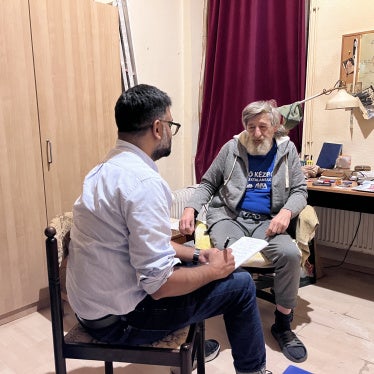In one month, the board of the Extractive Industries Transparency Initiative (EITI), an international multi-stakeholder group, will decide whether to suspend the natural resource-rich government of Azerbaijan for failing to comply with EITI standards.
The potential suspension hangs on whether Azerbaijan’s government has met EITI demands to reform laws that restrict civil society organizations’ ability to register and access international funding. Meeting EITI standards on a range of issues is an important marker for public and private investors to know how transparent a government is about how it spends hydrocarbon profits.
Today, EITI Board Chair Fredrik Reinfeldt visited Baku, Azerbaijan’s capital, where he met with Azerbaijan President Ilham Aliyev. According to today’s official statement from EITI, the purpose of the meeting was to discuss steps Azerbaijan is taking to “ensure that civil society can play its role” within EITI. The current restrictions mean groups can’t operate freely and promote government accountability and transparency.
Reinfeldt also met with some independent non-governmental organizations (NGOs) and activists, who bravely continue their work despite government hostility and obstruction.
EITI, which encourages public debate on how oil, gas, and mining revenues are used, is right to be concerned.
Azerbaijan has been under EITI scrutiny since April 2015 when the board downgraded its status from member to candidate country in response to the government’s sweeping crackdown on independent groups and activists. EITI issued detailed requirements for Azerbaijan to have its status restored.
Despite some positive steps, no one can argue that a true “enabling environment for civil society” – a key EITI requirement – exists in Azerbaijan.
One year ago, the government released a number of high-profile activists and journalists imprisoned on politically motivated charges. But there has been no meaningful change. In the face of restrictive laws and regulations, many independent groups have had to downsize, suspend activities, or close. Numerous activists fled the country, fearing arrests. Many who remain in the country are barred from traveling. The government is unrelenting in its targeting of critical activists, bloggers, and journalists with criminal prosecutions, threats, and harassment.
The government made changes to regulations on civil society last month, simplifying some procedures for registration of foreign grants. But the changes are unlikely to fundamentally alter the complex scheme created and controlled by the authorities that prevents groups from securing independent funding.
While the March EITI board meeting will focus just on reforms to three laws, board members shouldn’t lose sight of the bigger picture.
It will take more than cosmetic changes to salvage Azerbaijan’s vanishing space for civil society. The EITI board should settle for nothing less than fundamental and lasting changes that would ensure a true environment for civil society groups to operate.









